| Author |
Message |
    
Thefleshrocket
| | Posted on Friday, September 15, 2017 - 11:57 am: | 





|
Thanks, Mope. It might be a coincidence, but since the rotor I received doesn't seem to be straight, the ones for sale on Ebay could be from the "totally roached" batch. I'll just send this one back for a refund. |
    
Nuts4mc
| | Posted on Friday, September 15, 2017 - 12:16 pm: | 





|
EBC not to be confused with EBR makes replacement disks for the front ...JC Whiitney used to sell them at fire sale prices...not anymore...they may be lower cost than a OEM disk from EBR:
https://www.amazon.com/EBC-Brakes-MD735RS-Standard -Replacement/dp/B00N41KP2K
hth |
    
Willmrx
| | Posted on Friday, September 15, 2017 - 06:28 pm: | 





|
I have a EBC front rotor on one of my 1125r and have put 4000 miles plus on it, and so far so good, |
    
Yankeerl
| | Posted on Friday, September 15, 2017 - 10:55 pm: | 





|
amazon has a shop selling these for about 180.been debating trying one on my R. it has a pretty bad pulsation since i bought it |
    
Terrys1980
| | Posted on Saturday, September 16, 2017 - 10:19 am: | 





|
That EBC rotor is about the ugliest thing ever seen but has more metal to dissipate heat.. I've used Galfer on both my previous Buells with no issues.. |
    
Thefleshrocket
| | Posted on Monday, September 18, 2017 - 01:49 pm: | 





|
Thanks, Nuts.. that definitely helped. I had ordered one of the used 1125R rotors for $90 on Ebay, but the link you shared had a seller that had a new EBC rotor for $146, so I jumped on it and cancelled the Ebay order. |
    
Thefleshrocket
| | Posted on Monday, September 18, 2017 - 04:45 pm: | 





|
Dadams said: "I believe EBR (and Buell previously) stated that the bolts for the rotor were a one time use only item mainly due to the pre-applied loctite on them. It's white. I've not looked for that specific type, but in *theory* you could run a tap into each hole, spray cleaner in each one, clean the threads and then apply the proper type of loctite when re-assembling it."
I haven't had any luck finding the new hardware kit in stock, so I'm inclined to clean the existing mounting hardware, use some new Loctite, and let it ride. But apparently there is more than one type of "white Loctite".
There's Loctite 567. "Off-white, low disassembly strength methacrylate thread sealant, ideal for sealing coarse threads up to M80/R3”. UL approved."
http://na.henkel-adhesives.com/product-search-1554 .htm?nodeid=8797713629185
There's also Loctite 592. "LOCTITE® 592 Slow Cure Thread Sealant locks and seals threaded fittings. Parts may be repositioned up to 24 hours after application. Slow cure, high temperature." Says it's good up to 400F, which might be worthwhile for a brake rotor application.
http://www.na.henkel-adhesives.com/product-search-1554.htm?nodeid=8797961093121
That said, I have always relied on blue (medium strength) Loctite unless another type is specified. Any objection to just using that stuff, if a concrete answer about the white stuff isn't forthcoming? EDIT: If my assumption is correct that the white Loctite is the "high temp" stuff, it would probably not be wise to use non-temperature-compliant stuff.
(Message edited by thefleshrocket on September 18, 2017) |
    
D_adams
| | Posted on Monday, September 18, 2017 - 05:54 pm: | 





|
I've asked, waiting on a reply back in regards to the Loctite equivalent. |
    
Araignee
| | Posted on Monday, September 18, 2017 - 09:07 pm: | 





|
EBR shipped me a new mounting hardware kit last Friday.
Dieselmoto was waiting on the copper washers, but does have them in stock now and thus should also be able to ship the latest mounting hardware.
I've had good interactions with both of the above and try to use them when I can.
Given the operating conditions of the front rotor, I'd bet the high temp white Loctite is the right answer. |
    
Thefleshrocket
| | Posted on Tuesday, September 26, 2017 - 10:53 pm: | 





|
I installed the EBC rotor and new DP Brakes pads this morning. I used the high-temp white Permatex and.. the same thing happened. The pads embedded a fragment into the rotor, which damaged the pads, which damaged the rotor. This time it was one of the inboard pads. I noticed the odd wear pattern after just a 7-mile ride to work, which involved light / casual braking.
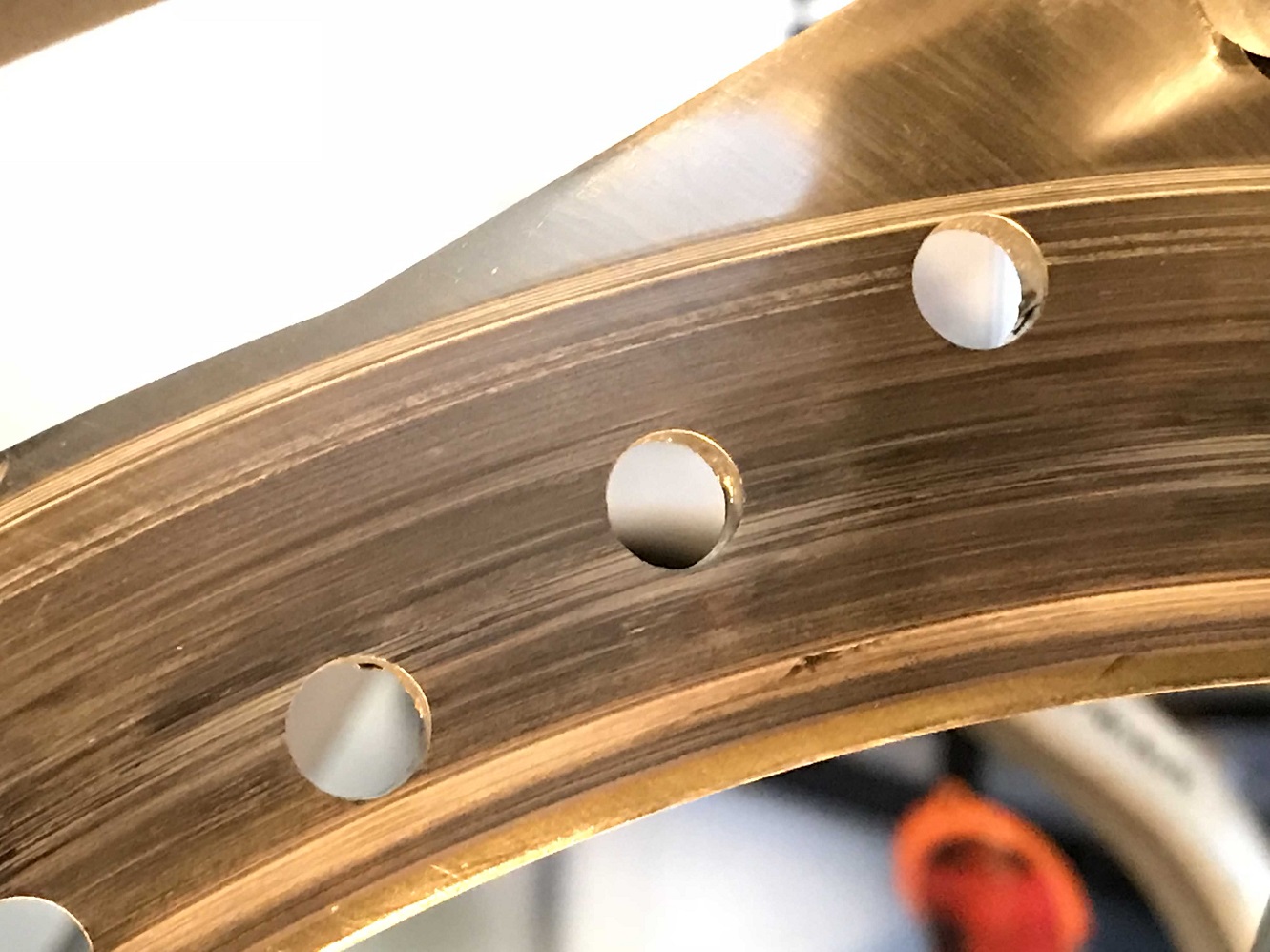
In this pic, you can see the tiny embedded fragment at the top middle.
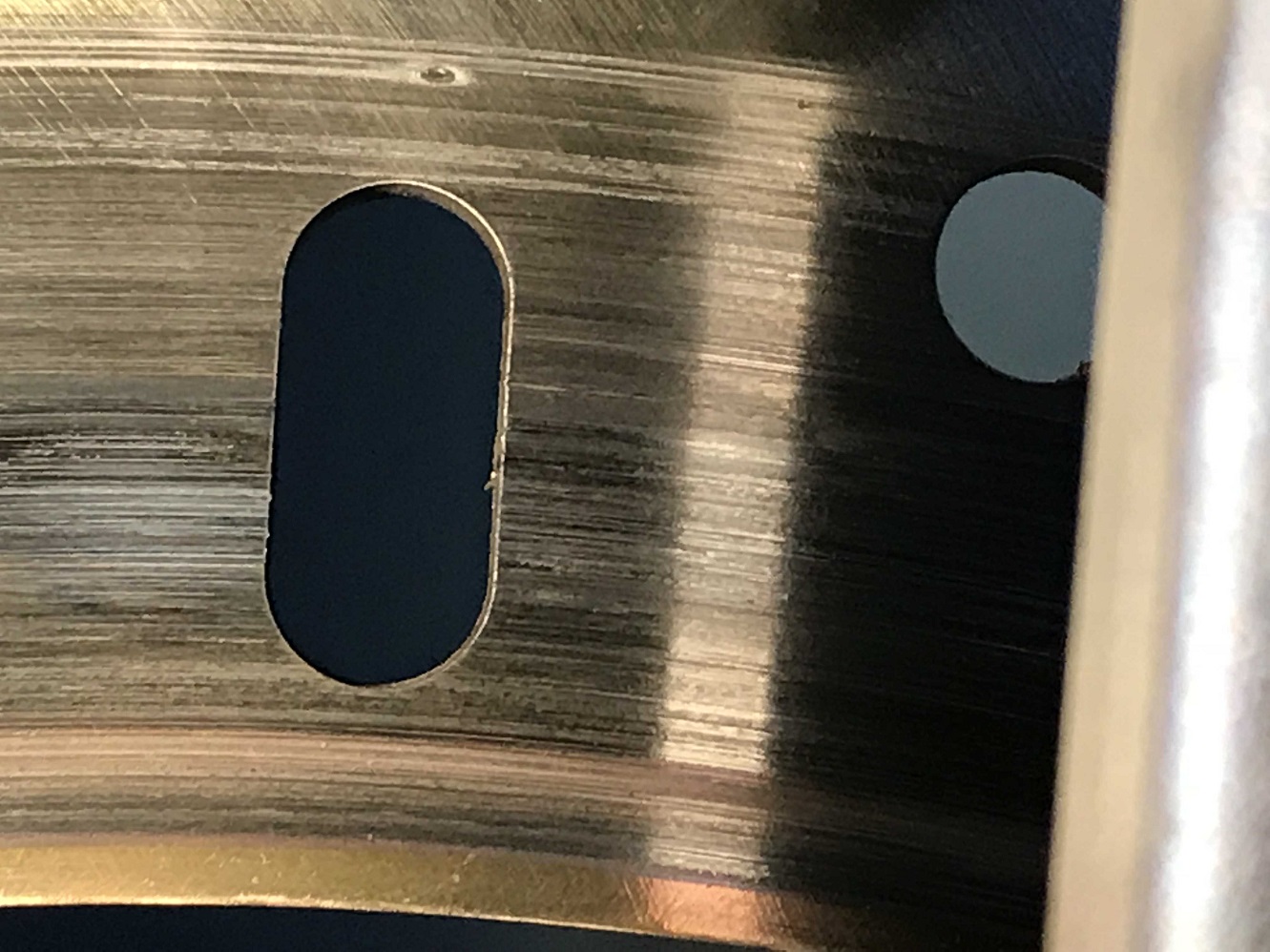
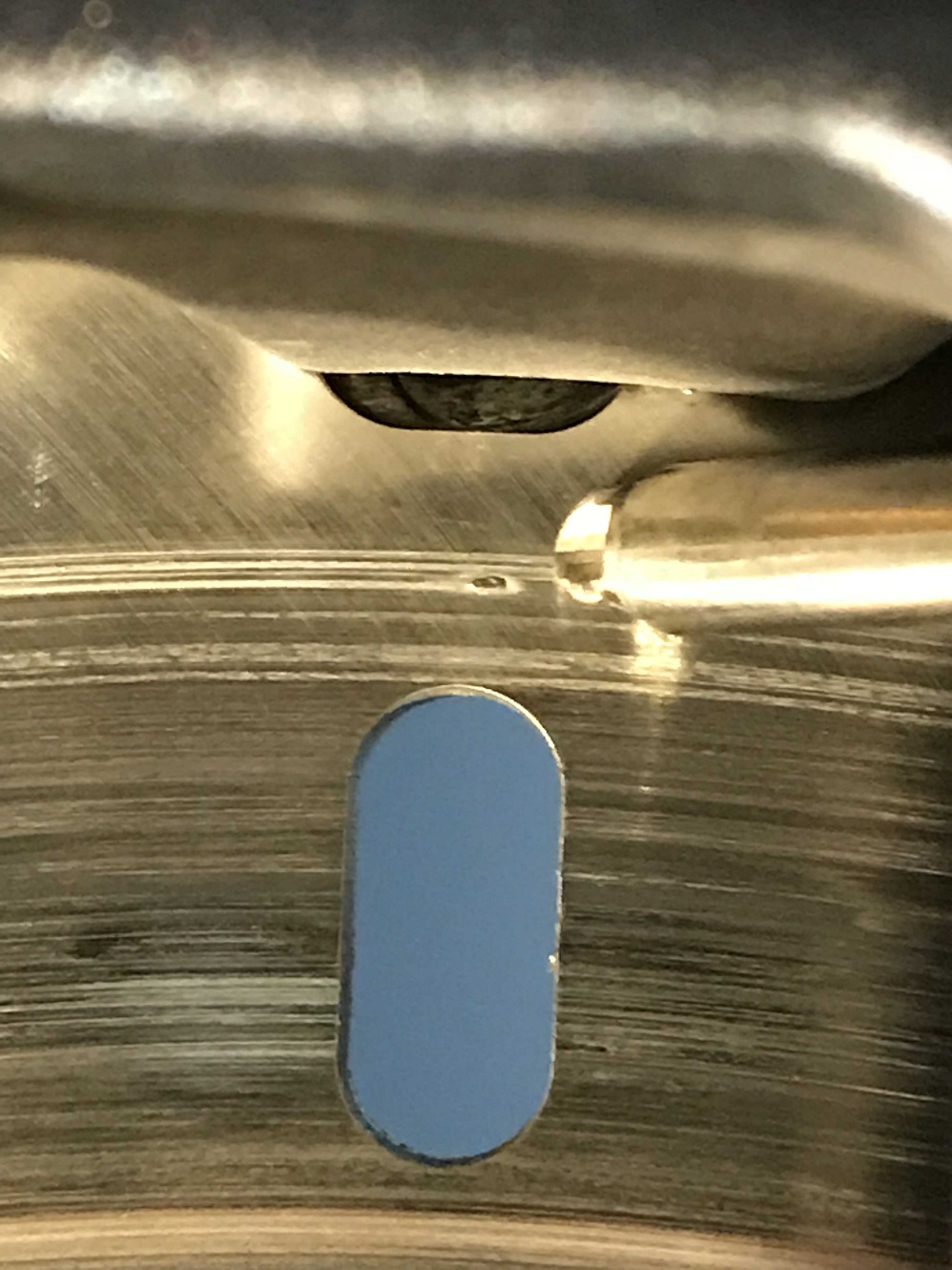
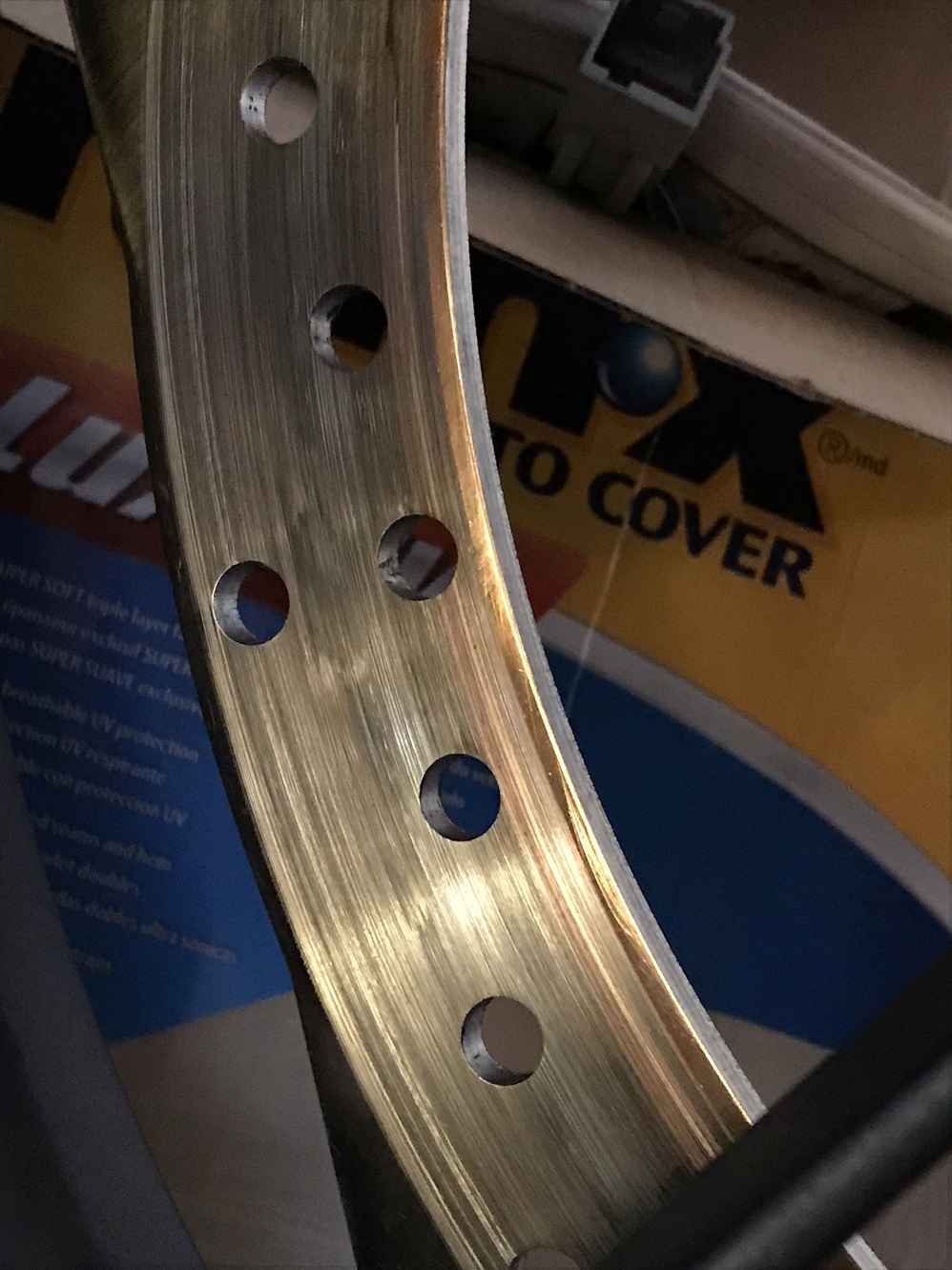
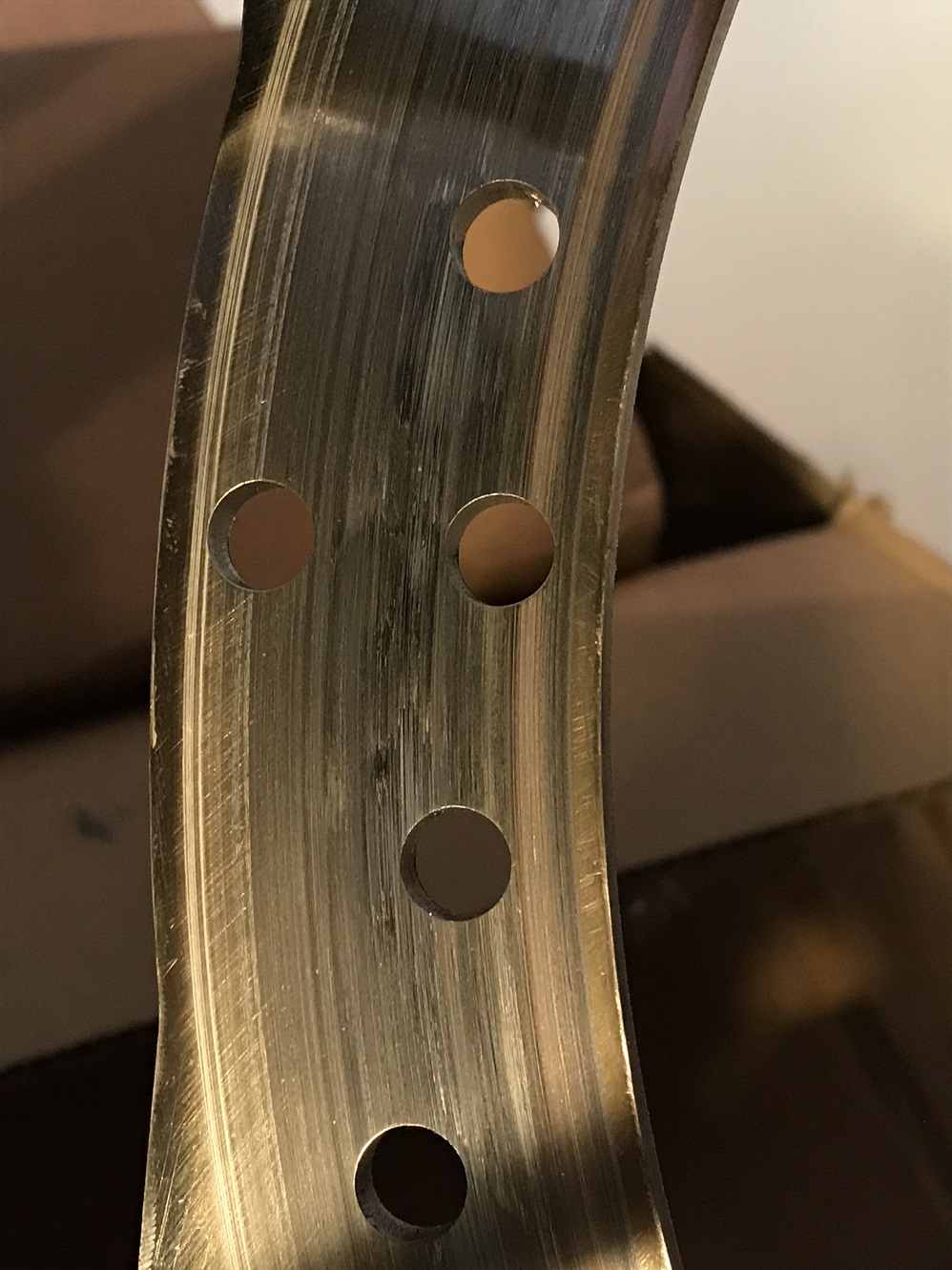
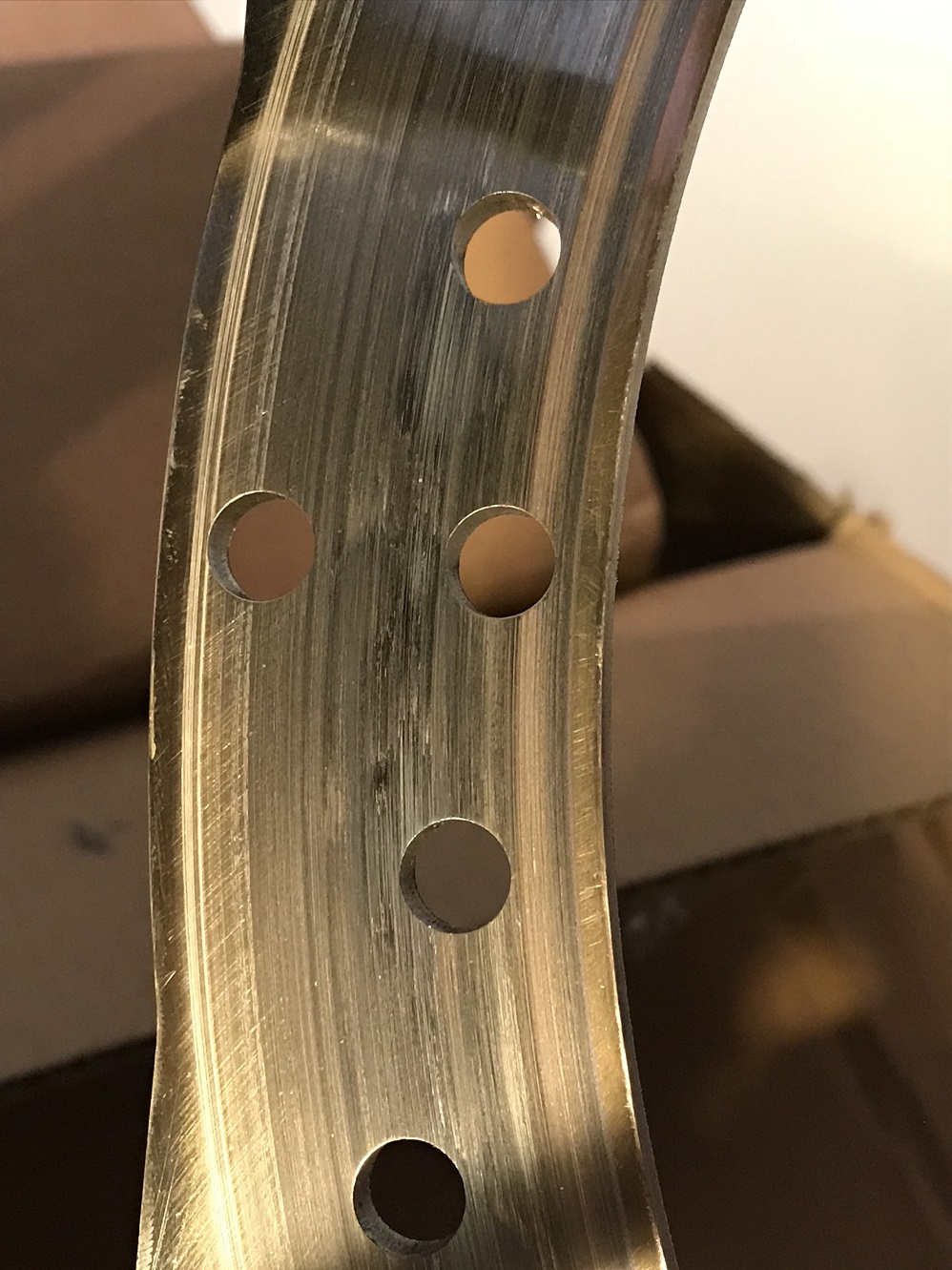
Here are the old pads. You can see how they started fragmenting along the edges. I haven't taken pics of the new pads, but I assume they look similar but not as bad. The old pads have fewer than 1000 miles on them, and the new pads only have about 50.
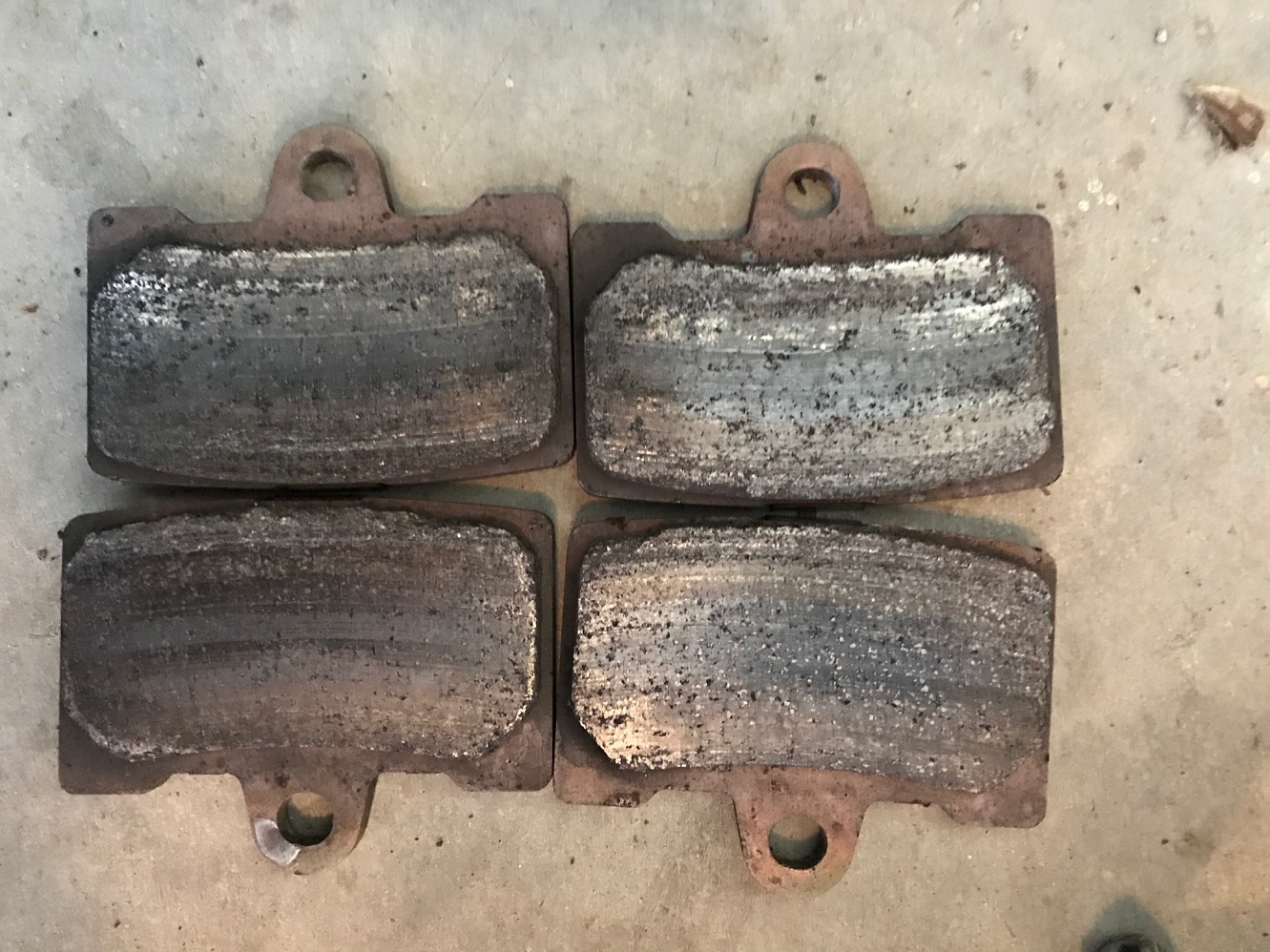
 |
    
Terrys1980
| | Posted on Saturday, September 30, 2017 - 12:13 pm: | 





|
Spend a little more to get the Galfer and burn up all the HH pads you want. The Galfer looks better and has an awesome sound when stopping.
Had the Galfer rotor on my XB and CR.. |
    
Stevel
| | Posted on Sunday, October 01, 2017 - 03:57 am: | 





|
That failure was caused by pad incompatibility with the rotor material. When using stainless steel rotors, soft non-metallic pads are your only choice. If you want to use metallic sintered pads for performance, you need to use cast iron rotors. The problem is no one makes them for this bike. |
    
Thefleshrocket
| | Posted on Tuesday, October 03, 2017 - 12:19 am: | 





|
Stevel, I've used one or two sets of DP HH+ pads on my 1125R before I started having issues. Do you have any idea how I could have "gotten lucky" before, and then had two sets of pads damage two rotors?
What's the next-best rotor option if nobody makes an iron rotor? Galfer? EBR 1190? Chinese knockoff? (Mostly joking with that last one..)
What do you think of Terry's suggestion? According to the installation guide for the Galfer discs:
"Galfer Wave® rotors are made of a proprietary high carbon content 420 stainless steel. This steel has many great characteristics but due to the carbon content of the steel (which gives the rotor better memory retention and strength) some surface rust may occur."
That sounds.. promising?
http://galferusa.com/static/files/downloads/Wave%C2%AE%20Rotors.pdf
I Googled for resurface motorcycle rotors and came up with this site as one of the top hits, that claims it resurfaces stainless steel motorcycle rotors (at $45 each). Thoughts?
https://www.truedisk.net/
Braking doesn't specify what kind of steel its W-FIX rotors (which is what it sells for the 1125s) are made from, on its technical sheet: http://www.braking.com/DIS/sito/documenti_allegati/54_link_inglese_ONROAD-W-FIX.pdf
(Message edited by thefleshrocket on October 03, 2017) |
    
Thefleshrocket
| | Posted on Tuesday, October 03, 2017 - 01:30 am: | 





|
More reading into pad and rotor compatibility, I found this page:
https://ebcbrakes.com/brakes-selector-chart/
EBC says "any pad" is safe to use with the MD series of rotors, of which the 1125R rotor is a member (part number MD735RS). This of course runs contrary to the little note included with the rotors.
EBC can get bent. Sooo tired of getting burned by that company's crap. |
    
Stevel
| | Posted on Tuesday, October 03, 2017 - 05:10 am: | 





|
Personally, I dislike all SS rotors regardless of the compatibility issue. These rotors exhibit non-linear drag where upon initial application provide low friction, but then as the temperature rises, the drag will start to rise without any increase of brake pressure. This is very disconcerting and often results in the brake unexpectingly grabbing. This characteristic is not exhibited by cast iron.
The very best rotors that I ever used were sold in the '70s by a company called "Hunt" These were aluminum that were Iron clad. I suspect the Iron was applied via a plasma spray, but I'm not certain about the process used. The company no longer exists unfortunately. The level of brake friction was very consistent, linear and very controllable. I still have a new one laying around somewhere. I will find it and take some photos. |
    
Araignee
| | Posted on Tuesday, October 03, 2017 - 10:11 am: | 





|
Early Buells like the RR1000 used a type of aluminum cored rotor, with a cladding of stainless steel. I believe they were dropped due to problems with degradation or de-lamination of the cladding from the core.
Perhaps they were friction welded? Don't know if that's the correct term, but I'm referring to the process that consists of spinning two unlike metals very fast and them slamming their mating surfaces together under great pressure, creating a sort of weld where the metals fuse.
They were available from Pittsburgh Performance Products, and listed in Buell's advertising literature of the time.
They were reputed to be very lightweight (55% of comparable-sized cast iron), but I don't know how they performed or responded to heat. |
    
Thefleshrocket
| | Posted on Wednesday, October 04, 2017 - 01:35 am: | 





|
Stevel, is 420 steel any more durable and tolerant of HH pads than 410 for the 1125 front rotor? The Galfer rotor is listed as being 420. The stock rotor is 410D, according to Dean Adams. I am not sure what the EBC rotor is made from. Perhaps butter and baby tears. |
    
Stevel
| | Posted on Wednesday, October 04, 2017 - 05:04 am: | 





|
I don't know the answer as to what 400 series steel is better at being a brake surface. Only testing would reveal the answer, but to do that correctly would also involve testing with a large selection of pad material. This kind of testing would be very expensive, so I seriously doubt that it has occurred. I do know that before durability can be established, initial rubbing must be done to glaze or work harden the surface. If that initial glazing does not happen, the steel will start to gall and that will destroy both the rotor and the pads. Unfortunately, industry relies on the general public to do their testing because of the immense cost. These 400 series rotors do work, not well, but adequately IF they use the factory recommended pad material and they break in the rotors correctly. If you start trying your own combinations of pads, be prepared to buy lots of rotors. |
    
Terrys1980
| | Posted on Wednesday, October 04, 2017 - 09:41 am: | 





|
410 has better Brinell hardness and slighty higher fatigue strength.
420 has twice the carbon which gives it higher shear strength, tensile stretch, pitting resistance, better strength to weight ratio and thermal shock resistance.
On a side note, the Galfer comes with a very specific bedding/break in procedure. |
    
Thefleshrocket
| | Posted on Wednesday, October 04, 2017 - 12:19 pm: | 





|
Terry, sounds like you're pretty strongly in favor of the Galfer rotor. Is there any odd or accelerated pad wear due to the "different" wave pattern? Any issues with fade or heat dissipation due to having less brake rotor material?
I bet my break-in process exacerbated the issue. I've always used the "8-10 pretty hard braking events from 60mph down to 10mph, then park the vehicle and let it cool down" method. I saw that the EBC rotor recommended light braking from 60-40, so I did that 7 or 8 times, and later did a few harder braking events from 60-10. I bet it was those last several harder braking events that did it. |
    
Thefleshrocket
| | Posted on Wednesday, October 04, 2017 - 01:32 pm: | 





|
Also, I emailed truedisk.net about their rotor resurfacing service. I got a very-quick reply, but unfortunately, they are not yet capable of resurfacing perimeter rotors, though they are working on a solution for being able to mount them for resurfacing. |
    
Thefleshrocket
| | Posted on Wednesday, October 04, 2017 - 01:43 pm: | 





|
Also, does anyone know what kind of steel the 1190 rotor is made from? I wonder if that's a viable option, or if I should consider the Galfer to be the best bet (pending Terry's input). |
    
Araignee
| | Posted on Wednesday, October 04, 2017 - 01:58 pm: | 





|
Just to toss another stick into the fire, Braking sells stainless steel wave-style rotors for both front(BL02FID ~$286), and rear(BL02RID ~$169). Suggested Braking pads are sintered front(939CM55 ~$70) and rear(938CM56 ~$56).
I have a set of the rotors listed above, which I plan to mount next year. I will probably use the EBC double H sintered pads which I have on hand, since the Braking site suggests that type.
It is worth noting that the rotors have German TUV certification, which is sort of like our DOT cert. The German TUV is quite rigorous, likely more so than DOT. The Braking rotors are of Italian design and seem to be made in Taiwan, which is a step or two above the Chinese in advanced manufacturing technical skills. Apparently they are seeing use in MotoGP, according to the website.
When I was living in the UK in the 90s, there was much howling among riders over EU aftermarket parts regulations. The draconian evil-minded biker-hating EU minister's name was ironically Bannemann, and you could actually buy knee sliders with his face on them. I think one of the UK biker mags created and sold them. Spirited lot, the blokes.
The German bikers I met howled the loudest, as their TUV was considered even more restrictive than the proposed EU rules. At one point, you couldn't put tires on your bike that weren't OEM. A lot of German bikers who had modified machines rode them to the IOM TT every year, because being unable to pass German TUV testing essentially made them illegal in Germany. Much debate between various nationalities over whose laws were most anti-biker in the pubs on the island.
Once I get some time in on the rotors and pads, I'll post my impressions.
Stevel, can you comment on the current state of TUV strictness or on the wave-type rotors? |
    
Terrys1980
| | Posted on Wednesday, October 04, 2017 - 02:42 pm: | 





|
Yep I do recall several light braking before doing any hard stops. I also think there is a recommended mileage before hard braking as well.
I never noticed any weird pad wear. The rotor obviously has less material which could be more susceptible to warping. A lot of it has to do with your riding habits.
I'd definitely consider putting a Galfer on my 1190 if I ever have to change it. |
    
D_adams
| | Posted on Wednesday, October 04, 2017 - 05:52 pm: | 





|
quote:does anyone know what kind of steel the 1190 rotor is made from?
Same as the 1125 rotors. Front rotor is 410D stainless. Got that from one of the engineers at Buell a while back. |
    
Stevel
| | Posted on Thursday, October 05, 2017 - 02:04 pm: | 





|
In order to be legal in Germany, every part on the motor vehicle must be OEM, or a duplicate of OEM. If an owner wants to change anything on the vehicle, the part must have TUV type approval. TUV type approval must be applied for by the manufacturer or importer. There will be a TUV approval number and certificate supplied with every shipment. These approval documents must be kept with the vehicle available for viewing at the semi-annual inspections by TUV and/or the police at any time of their choosing. There are no exceptions all parts fall into this regulation. Of course, you can occasionally slide by if you have a relationship with the inspector. It is also possible that an individual can request a type approval inspection of custom or unique parts, but it is expensive. These inspections require all relevant engineering drawings and material specs. |
    
Araignee
| | Posted on Thursday, October 05, 2017 - 11:06 pm: | 





|
Thanks, stevel, I didn't want to overstate the TUV strictness based only on my foggy memories of 20 years ago.
There are both positive and negative effects of the German approach. Given the high speeds allowed on the autobahns, it is positive that most vehicles are subject to testing to prove they are up to the task. All of us are safer if vehicles are well designed and maintained.
It is understandable, yet unfortunate that testing and certification requirements imposed by TUV are expensive enough that well-designed components not financially supported by major manufacturers may not be available to improve the performance or safety of our machines.
The quality of aftermarket parts for Buells available in Germany -and in the UK- indicates an appreciation for the marquee and Eric's innovations. |
    
Araignee
| | Posted on Thursday, October 05, 2017 - 11:13 pm: | 





|
Thanks, stevel, I didn't want to overstate the TUV strictness based only on my foggy memories of 20 years ago.
There are both positive and negative effects of the German approach. Given the high speeds allowed on the autobahns, it is positive that most vehicles are subject to testing to prove they are up to the task. All of us are safer if vehicles are well designed and maintained.
It is understandable, yet unfortunate that testing and certification requirements imposed by TUV are expensive enough that well-designed components not financially supported by major manufacturers may not be available to improve the performance or safety of our machines. This echoes your comments regarding brake disc composition and compromises. I too am a fan of the consistency of cast iron discs and organic pads.
The quality and innovation of aftermarket parts for Buells available in Germany -and in the UK- indicates an appreciation for Eric's designs. |
    
Thefleshrocket
| | Posted on Friday, October 06, 2017 - 10:53 am: | 





|
Good news--the DP Brakes rep is sending me two new sets of pads (and a hat and t-shirt). The imperfections are pretty tiny--I think I am going to use a file to get them off and then hit both sides of the EBC rotor with a disc sander. Then I'll mount up the new pads and break them in GENTLY.
Here are pics of the spots:
Spot #1: http://www.thefleshrocket.com/images/bike/1125r/br akes/IMG_9957.JPG
Spot #2: http://www.thefleshrocket.com/images/bike/1125r/br akes/IMG_9959.JPG |
    
Thefleshrocket
| | Posted on Friday, October 06, 2017 - 07:14 pm: | 





|
On a related note, what's the part number for the pin that holds the brake pads in place? I apparently didn't have the allen head fully seated when removing one of them and slightly stripped it. |
    
Terrys1980
| | Posted on Sunday, October 08, 2017 - 10:26 am: | 





|
Somehow my 1125 parts manual pdf got corrupted but the EBR part # is H0026.1B6. Should be same..
(Message edited by terrys1980 on October 08, 2017) |
    
Thefleshrocket
| | Posted on Monday, October 09, 2017 - 10:39 pm: | 





|
Thanks, Terry! |
|